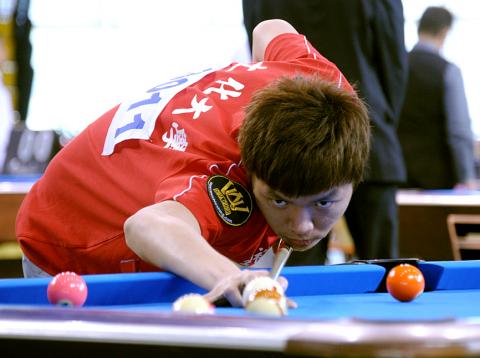The Sports Affairs Council yesterday said it regretted a decision by Wu Chia-ching (吳珈慶), the nation’s top pool player, to relocate to China and take Chinese citizenship to participate in international tournaments.
Wu, 22, rose to fame after he won the world 8-ball and 9-ball championships in 2005 at the age of 15. He first courted controversy two years ago when it was discovered that he was considering applying for Singaporean citizenship to further his career.
Wu said yesterday that his decision to become a citizen of the People’s Republic of China (PRC) was made purely for professional reasons and should not be regarded in a political light.

Photo: Hsu Ming-li, Taipei Times
However, the council said Wu’s decision could have consequences.
“While the application was filed for Wu’s personal reasons … the action could have violated regulations in Taiwan, given the complicated cross-strait situation,” the council said in a statement.
Still, there were some words of encouragement.
“We respect his choice,” council spokesperson Steven Chen (陳士魁) said. “We hope that he can perform as well as other Taiwanese athletes and he has our blessings.”
While the council had no right to stop athletes from seeking a professional sports career abroad, the nation should assess whether it provides a good environment for athletes, Chen said.
“We have budgeted the Sports Development Fund (運動發展基金) to subsidize excellent athletes,” he said. “Hopefully we can retain more talented people in Taiwan.”
Chinese Taipei Billiards Association chairman Tu Yung-hui (涂永輝) said the association was unaware that Wu, 22, would represent China at the Beijing Open hosted by the World Pool-Billiard Association (WPA) on Monday until it was officially informed by the China Billiard Association (CBA) on Wednesday.
The CBA sent Tu a fax showing Wu had obtained a temporary resident identification card for the PRC, meaning that he would soon receive his official residency documents.
During a telephone interview with the Taipei Times, Wu’s uncle, who refused to give his name, but is with Wu in Beijing, accused Tu and the Chinese Taipei Billiard Association of “destroying” Wu’s career before he could accept a nationality deal offered by Singapore.
Wu’s decision was made so that he could focus on playing pool, the uncle said, adding that the CBA had never approached Wu.
“Wu … has been staying with me in Shenzhen, Guangdong Province, since March last year,” the uncle said.
Tu said he had met Wu and his father in 2009 after learning that Wu was considering becoming a Singaporean citizen.
“We told them that if he chose to go to Singapore, he could not participate in any tournament in Taiwan, nor could he represent Taiwan at any international competition,” Tu said.
Wu was also told he might be asked to return a NT$900,000 national award if he joined Singapore’s national team, Tu said.
While the association cannot guarantee an annual salary, Tu said Wu had plenty of opportunities to play in Taiwan and could easily have collected award money.
Wu went ahead with his decision to go to Singapore, Tu said as he showed reporters an agreement signed by Wu saying he understood the consequences.
ADDITIONAL REPORTING BY CNA

Auckland rang in 2026 with a downtown fireworks display launched from New Zealand’s tallest structure, Sky Tower, making it the first major city to greet the new year at a celebration dampened by rain, while crowds in Taipei braved the elements to watch Taipei 101’s display. South Pacific countries are the first to bid farewell to 2025. Clocks struck midnight in Auckland, with a population of 1.7 million, 18 hours before the famous ball was to drop in New York’s Times Square. The five-minute display involved 3,500 fireworks launched from the 240m Sky Tower. Smaller community events were canceled across New Zealand’s

The Ministry of Foreign Affairs (MOFA) yesterday said it is closely monitoring developments in Venezuela, and would continue to cooperate with democratic allies and work together for regional and global security, stability, and prosperity. The remarks came after the US on Saturday launched a series of airstrikes in Venezuela and kidnapped Venezuelan President Nicolas Maduro, who was later flown to New York along with his wife. The pair face US charges related to drug trafficking and alleged cooperation with gangs designated as terrorist organizations. Maduro has denied the allegations. The ministry said that it is closely monitoring the political and economic situation

‘SLICING METHOD’: In the event of a blockade, the China Coast Guard would intercept Taiwanese ships while its navy would seek to deter foreign intervention China’s military drills around Taiwan this week signaled potential strategies to cut the nation off from energy supplies and foreign military assistance, a US think tank report said. The Chinese People’s Liberation Army (PLA) conducted what it called “Justice Mission 2025” exercises from Monday to Tuesday in five maritime zones and airspace around Taiwan, calling them a warning to “Taiwanese independence” forces. In a report released on Wednesday, the Institute for the Study of War said the exercises effectively simulated blocking shipping routes to major port cities, including Kaohsiung, Keelung and Hualien. Taiwan would be highly vulnerable under such a blockade, because it

UNRELENTING: China attempted cyberattacks on Taiwan’s critical infrastructure 2.63 million times per day last year, up from 1.23 million in 2023, the NSB said China’s cyberarmy has long engaged in cyberattacks against Taiwan’s critical infrastructure, employing diverse and evolving tactics, the National Security Bureau (NSB) said yesterday, adding that cyberattacks on critical energy infrastructure last year increased 10-fold compared with the previous year. The NSB yesterday released a report titled Analysis on China’s Cyber Threats to Taiwan’s Critical Infrastructure in 2025, outlining the number of cyberattacks, major tactics and hacker groups. Taiwan’s national intelligence community identified a large number of cybersecurity incidents last year, the bureau said in a statement. China’s cyberarmy last year launched an average of 2.63 million intrusion attempts per day targeting Taiwan’s critical